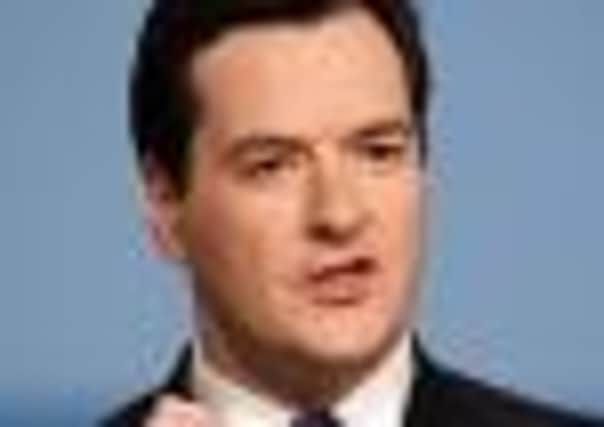Osborne: Referendum ball in Salmond’s court


The Chancellor became the latest figure to enter the controversy on a visit to Elgin yesterday with new Scottish Conservative leader Ruth Davidson.
His intervention came as a constitutional expert warned that the SNP has no legal right to stage a vote, with any bill “unlikely” to get through Holyrood and destined to fall foul of the courts.
Advertisement
Hide AdAdvertisement
Hide AdDr Cormac Mac Amhlaigh, an expert in constitutional law at Edinburgh University, said only the coalition government at Westminster can hold such a referendum.
His comments follow similar remarks by Professor Adam Tomkins of Glasgow University in a submission to a Commons inquiry.Mr Osborne said: “The ball is in Alex Salmond’s court.
“He is the one who has advocated Scotland becoming independent, so its really for him to suggest how he will hold the referendum and when he will hold it. It’s for him to explain the legal basis of what he is proposing to do.
“I think the legal issues will be flushed out as we contemplate the prospect of a referendum.”
Dr Mac Amhlaigh said Holyrood’s powers are “very clearly set out” in the Scotland Act which brought about its establishment. He said: “It cannot pass acts which relate to the constitution and the executive cannot act in ways which affect the constitution.
“A referendum on independence by any legal reading affects the constitution and therefore would be outwith the power of the Scottish Parliament.”
The academic said the Scotland Act contains a number of “pre-enactment measures” to ensure that Holyrood does not act outwith its powers.
As well as the Scottish Government’s own law officers, Parliament’s legal advisers would have to pass a referendum bill and it could then be referred to UK privy council to check its competence. He said: “If it manages to get through all those hurdles – which is in my view very unlikely – then it could be challenged through the courts as being outside the competence of the parliament.”
Advertisement
Hide AdAdvertisement
Hide AdBut he added: “If enough of a political issue could be made out of the fact that a referendum was not possible then, that would be a separate issue. Legally the position is clear, but the politics of it is another question completely.
“The key thing is that sometimes acting against the law has popular support. Maybe the SNP is taking a gamble in that they know they’re acting against the law, but they think they can get popular support for it.”
But a spokesman for Mr Salmond said yesterday that a host of constitutional experts, as well as the Prime Minister and Scottish Secretary Michael Moore, have backed the SNP’s authority to hold a referendum.
“We are totally confident of the legal position, as confirmed by a range of legal experts, and will bring forward a Referendum Bill for the vote on Scotland’s future to take place in the second half of this parliament,” he said.
“Everyone else, including the Prime Minister and Scottish Secretary, accepts the right of the Scottish Government and Parliament to hold the referendum.”
The SNP are keen to include an option on beefed-up powers for the Scottish Parliament, known as “devo-max”, on the referendum ballot paper, alongside the choice of independence or the status quo. Opposition parties say it should be a straight “yes or no” on independence.
Although no date has been set, the SNP say it will be at some point between 2014 and mid 2016.
Scottish Liberal Democrat leader Willie Rennie said: “Alex Salmond’s referendum strategy is clearly in crisis now. We need clarity on the question quickly otherwise he is going to lose the authority on the mandate that he gained in May.
Advertisement
Hide AdAdvertisement
Hide Ad“The central problem is that he is proposing a referendum that wouldn’t deliver a clear result, leaving himself open to accusations of a rigged referendum.”
Labour leader Iain Gray said the latest row raises issues that have to be addressed. “My view is that the SNP have a political mandate to call a referendum, but it is important that it is done properly and fairly,” he said.
“That is why I have called for a clear question, a clear timescale and the Electoral Commission to police the rules.”
Tory constitution spokesman David McLetchie said: “The SNP must start to provide answers to the increasing number of questions surrounding their plans for separation.”
In his submission to the Scottish affairs select committee this week, Prof Tomkins warned any attempt by Mr Salmond to hold an independence referendum would be blocked in the courts – and that even an advisory vote would be outside the Scottish Government’s powers and subject to legal challenges.
He called for the UK government to call the referendum “as expeditiously as possible” and for it to be run by the Electoral Commission.
His preferred wording to be put to voters is “Do you wish Scotland to secede from the United Kingdom?”.
Prof Tomkins said: “Scottish ministers do not speak for Scotland generally [either in law or in fact]. In law they speak on devolved matters.”